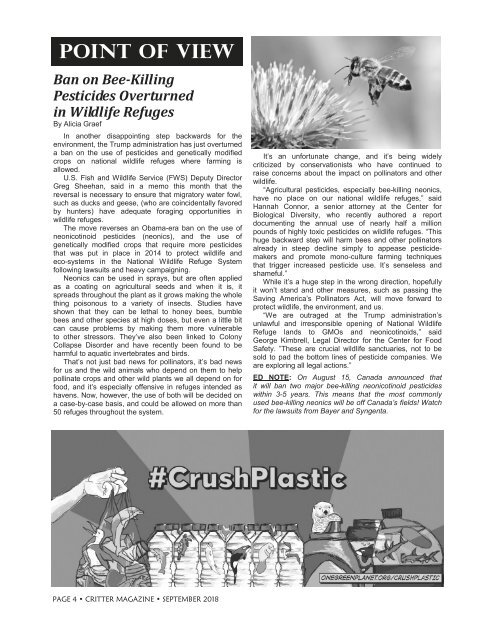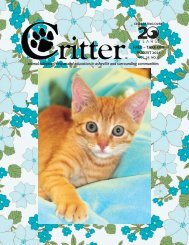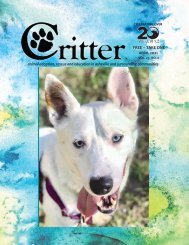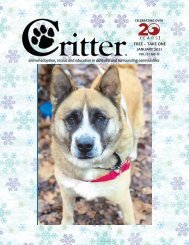Create successful ePaper yourself
Turn your PDF publications into a flip-book with our unique Google optimized e-Paper software.
Point of View<br />
Ban on Bee-Killing<br />
Pesticides Overturned<br />
in Wildlife Refuges<br />
By Alicia Graef<br />
In another disappointing step backwards for the<br />
environment, the Trump administration has just overturned<br />
a ban on the use of pesticides and genetically modified<br />
crops on national wildlife refuges where farming is<br />
allowed.<br />
U.S. Fish and Wildlife Service (FWS) Deputy Director<br />
Greg Sheehan, said in a memo this month that the<br />
reversal is necessary to ensure that migratory water fowl,<br />
such as ducks and geese, (who are coincidentally favored<br />
by hunters) have adequate foraging opportunities in<br />
wildlife refuges.<br />
The move reverses an Obama-era ban on the use of<br />
neonicotinoid pesticides (neonics), and the use of<br />
genetically modified crops that require more pesticides<br />
that was put in place in 2014 to protect wildlife and<br />
eco-systems in the National Wildlife Refuge System<br />
following lawsuits and heavy campaigning.<br />
Neonics can be used in sprays, but are often applied<br />
as a coating on agricultural seeds and when it is, it<br />
spreads throughout the plant as it grows making the whole<br />
thing poisonous to a variety of insects. Studies have<br />
shown that they can be lethal to honey bees, bumble<br />
bees and other species at high doses, but even a little bit<br />
can cause problems by making them more vulnerable<br />
to other stressors. They’ve also been linked to Colony<br />
Collapse Disorder and have recently been found to be<br />
harmful to aquatic invertebrates and birds.<br />
That’s not just bad news for pollinators, it’s bad news<br />
for us and the wild animals who depend on them to help<br />
pollinate crops and other wild plants we all depend on for<br />
food, and it’s especially offensive in refuges intended as<br />
havens. Now, however, the use of both will be decided on<br />
a case-by-case basis, and could be allowed on more than<br />
50 refuges throughout the system.<br />
It’s an unfortunate change, and it’s being widely<br />
criticized by conservationists who have continued to<br />
raise concerns about the impact on pollinators and other<br />
wildlife.<br />
“Agricultural pesticides, especially bee-killing neonics,<br />
have no place on our national wildlife refuges,” said<br />
Hannah Connor, a senior attorney at the Center for<br />
Biological Diversity, who recently authored a report<br />
documenting the annual use of nearly half a million<br />
pounds of highly toxic pesticides on wildlife refuges. “This<br />
huge backward step will harm bees and other pollinators<br />
already in steep decline simply to appease pesticidemakers<br />
and promote mono-culture farming techniques<br />
that trigger increased pesticide use. It’s senseless and<br />
shameful.”<br />
While it’s a huge step in the wrong direction, hopefully<br />
it won’t stand and other measures, such as passing the<br />
Saving America’s Pollinators Act, will move forward to<br />
protect wildlife, the environment, and us.<br />
“We are outraged at the Trump administration’s<br />
unlawful and irresponsible opening of National Wildlife<br />
Refuge lands to GMOs and neonicotinoids,” said<br />
George Kimbrell, Legal Director for the Center for Food<br />
Safety. ”These are crucial wildlife sanctuaries, not to be<br />
sold to pad the bottom lines of pesticide companies. We<br />
are exploring all legal actions.”<br />
ED NOTE: On August 15, Canada announced that<br />
it will ban two major bee-killing neonicotinoid pesticides<br />
within 3-5 years. This means that the most commonly<br />
used bee-killing neonics will be off Canada’s fields! Watch<br />
for the lawsuits from Bayer and Syngenta.<br />
PAGE 4 • CRITTER MAGAZINE • SEPTEMBER 2018

















